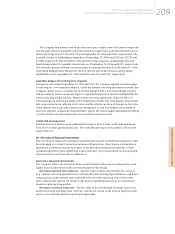Siemens 2006 Annual Report Download - page 212
Download and view the complete annual report
Please find page 212 of the 2006 Siemens annual report below. You can navigate through the pages in the report by either clicking on the pages listed below, or by using the keyword search tool below to find specific information within the annual report.
Notes to Consolidated Financial Statements
(in millions of €, except where otherwise stated and per share amounts)
208
Interest rate risk management
Interest rate risk arises from the sensitivity of financial assets and liabilities to changes in
market rates of interest. The Company seeks to mitigate such risk by entering into interest rate
derivative financial instruments such as interest rate swaps, options and, to a lesser extent,
cross-currency interest rate swaps and interest rate futures.
Interest rate swap agreements are used to adjust the proportion of total debt, and to a lesser
extent interest-bearing investments, that are subject to variable and fixed interest rates. Under
an interest rate swap agreement, the Company either agrees to pay an amount equal to a spec-
ified variable rate of interest times a notional principal amount, and to receive in return an
amount equal to a specified fixed rate of interest times the same notional principal amount or,
vice-versa, to receive a variable rate amount and to pay a fixed rate amount. The notional
amounts of the contracts are not exchanged. No other cash payments are made unless the
agreement is terminated prior to maturity, in which case the amount paid or received in settle-
ment is established by agreement at the time of termination, and usually represents the net
present value, at current rates of interest, of the remaining obligations to exchange payments
under the terms of the contract.
Derivative financial instruments not designated as hedges
The Company uses a portfolio-based approach to manage its interest rate risk associated with
certain interest-bearing assets and liabilities, primarily interest-bearing investments and debt
obligations. This approach focuses on mismatches in the structure of the interest terms of
these assets and liabilities without referring to specific assets or liabilities. Such a strategy
does not qualify for hedge accounting treatment under SFAS 133. Accordingly, all interest rate
derivative instruments used in this strategy are recorded at fair value as either an Other cur-
rent asset or Other current liability and changes in the fair values are charged to earnings.
Fair value hedges of fixed rate debt obligations
Under the interest rate swap agreements outstanding during the years ended September 30,
2006 and 2005, the Company agrees to pay a variable rate of interest multiplied by a notional
principle amount, and receive in return an amount equal to a specified fixed rate of interest
multiplied by the same notional principal amount. These interest rate swap agreements offset
an impact of future changes in interest rates on the fair value of the underlying fixed rate debt
obligations. The interest rate swap contracts are reflected at fair value in the Company’s Con-
solidated Balance Sheet and the related portion of fixed rate debt being hedged is reflected at
an amount equal to the sum of its carrying amount plus an adjustment representing the
change in fair value of the debt obligations attributable to the interest rate risk being hedged.
Changes in the fair value of interest rates swap contracts, and the offsetting changes in the
adjusted carrying amount of the related portion of fixed rate debt being hedged, are recog-
nized as adjustments to the line item Income (expense) from financial assets and marketable
securities, net in the Consolidated Statements of Income. Net cash receipts and payments
relating to such interest rate swap agreements are recorded as interest expense.
























